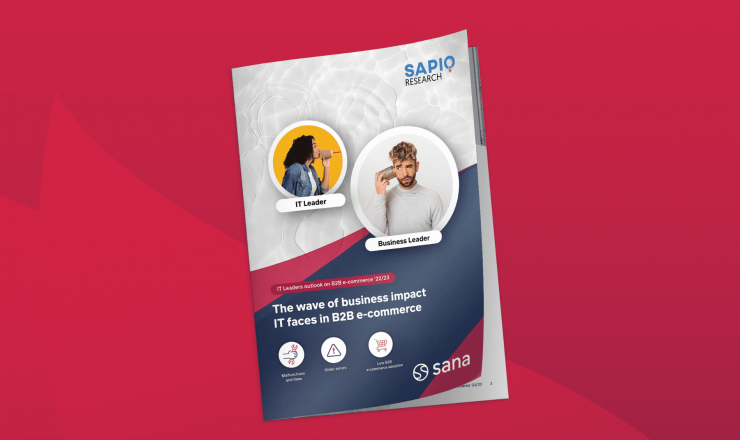

In a marketing context, two of the most common types of business models are B2B (business-to-business) and B2C (business-to-consumer). A B2B company largely targets an audience of other businesses, while a B2C business largely targets individual consumers.
It’s important to note, however, that there are not always clear delineations between B2B and B2C businesses. They may not exclusively work within one market or the other.
- For example, a packaging company that primarily targets an audience of warehouses and distribution centers may also sell excess product wholesale to individual consumers. While this company would primarily operate under a B2B model, it would also engage in elements of B2C marketing.
Because B2B e-commerce companies and B2C e-commerce businesses target very different audiences, they also need to approach marketing differently. This, in turn, means that B2B e-commerce should also focus on distinct KPIs (key performance indicators) that differ from KPIs crucial to B2C businesses.
B2B vs. B2C e-commerce: What are the biggest differences?
While the specifics of how each marketing campaign operates will depend on their unique audience and circumstances, there are some typical differences between B2B and B2C marketing efforts in the e-commerce industry. These differences include:
- The appropriate tone;
- The expertise required;
- The length of the client relationship;
- The importance of return on investment (ROI);
- The value of deliverables;
- The size of your client base;
- The concerns of your client base;
- The importance of relationship-building with your client.
Largely, these differences are driven by the unique needs of B2B audiences compared to B2C audiences.
Business to Business (B2B)
The following characteristics are typical of B2B marketing in the e-commerce industry:
- Marketing materials and communications use a tone and word choice that conveys a high degree of expertise and professionalism in a particular niche.
- The B2B business focuses on a very specific facet of an industry.
- Business-client relationships typically last for a long period.
- ROI is a significant concern for clients.
- Deliverables are typically high-value and may be part of a long-term contract or bulk purchase.
- The B2B business focuses on relatively few high-value contracts.
- Clients are interested in innovative, scalable deliverables and require sign-offs from many different teams within the company.
- The B2B business and its clients will cooperate and coordinate closely throughout the contract.
However, while these circumstances are typical of B2B business relationships, this may vary depending on the company or individual contracts. For example, while one client may make orders for materials or services with the B2B business over many years, another may simply make a one-time purchase.
Business to Customer (B2C)
The following characteristics are typical of B2C marketing in the e-commerce industry:
- Marketing materials convey more urgency and may use a playful tone.
- The B2C business offers a relatively broad range of products and services.
- Transactions are often one-time purchases on an as-needed basis, although efforts to develop brand loyalty will be made.
- Because individual customers are not usually making purchases that their livelihood heavily depends on, ROI is not as important as it is in a B2B context.
- Deliverables are lower value and purchased in smaller quantities.
- The B2C business has a large number of individual customers.
- Customers engage with marketing efforts that utilize compelling stories.
- Building brand loyalty is important, but the business-client relationship is not as close and cooperative as it is between B2B and its clients.
While these characteristics offer typical points of contrast between B2C and B2B businesses, there will be some variation based on the individual business. For example, very small B2C businesses may not have a large number of customers.
Focusing on B2B KPIs
Because marketing strategies differ between B2B businesses and B2C businesses, effective KPIs necessarily differ as well. Take a look at more effective metrics for a B2B e-commerce business below.
Effective metrics for B2B e-commerce businesses to measure
- Conversion rate
- Abandoned cart rates
- Web store adoption
- Page views, plus average time on page
- Purchases made online vs. offline
- Basket size
- Return on investment (ROI)
- Total cost of ownership (TCO)
Typical KPIs used by B2C businesses include:
- Website traffic
- Time-on-page
- Click-through rate
- Customer acquisition cost
While these metrics are effective for the typical B2C e-commerce business, they do not reflect the typical goals of a B2B e-commerce business.
Lead quality
B2B businesses should be concerned about meeting their quarterly and annual MQL (marketing qualified leads) and SQL (sales qualified leads) targets. These leads represent potential clients that are considered to be highly likely to continue through the sales funnel or become a customer.
Businesses can better meet their goals through the process of conversion rate optimization. B2B businesses typically have to focus on the quality of their leads versus the quantity, and therefore lead quality is a very important metric to track.
Lead velocity
“Lead velocity” refers to the speed at which a prospective client moves through the sales funnel. Again, B2B businesses are more focused on quality than quantity.
These businesses place more value on highly-customized experiences for a particular commercial niche than they do on widespread appeal to a diverse audience. Therefore, if they have properly zeroed in on their niche, leads should pass through the sales funnel relatively quickly compared to scattershot B2C leads.
Average contract value
Because B2B businesses typically rely on high-value deals with a relatively small number of unique clients, the average contract value is an incredibly important metric. By tracking average contract value, a B2B business can more effectively estimate its annual revenue and likelihood of meeting various goals.
Furthermore, it can help them review and adjust their ideal client profile (ICP), as this information allows businesses to analyze the typical trajectory of higher value contracts versus lower value contracts.
Customer lifetime value
Building long-term customer relationships is vital for many B2B companies. As such, these businesses will often find a lot of value in tracking the lifetime value (LTV) of their customers. Like average contract values, this metric can help companies estimate their revenue and analyze client behaviors.
However, this metric can further allow you to determine how customers behave under different market conditions, as well as any serious concerns regarding customer satisfaction.

Struggling to keep buyers on your web store?
Chances are your CX could use some (major) improvement. Get the free guide to learn the 3 fundamental pillars of CX.




